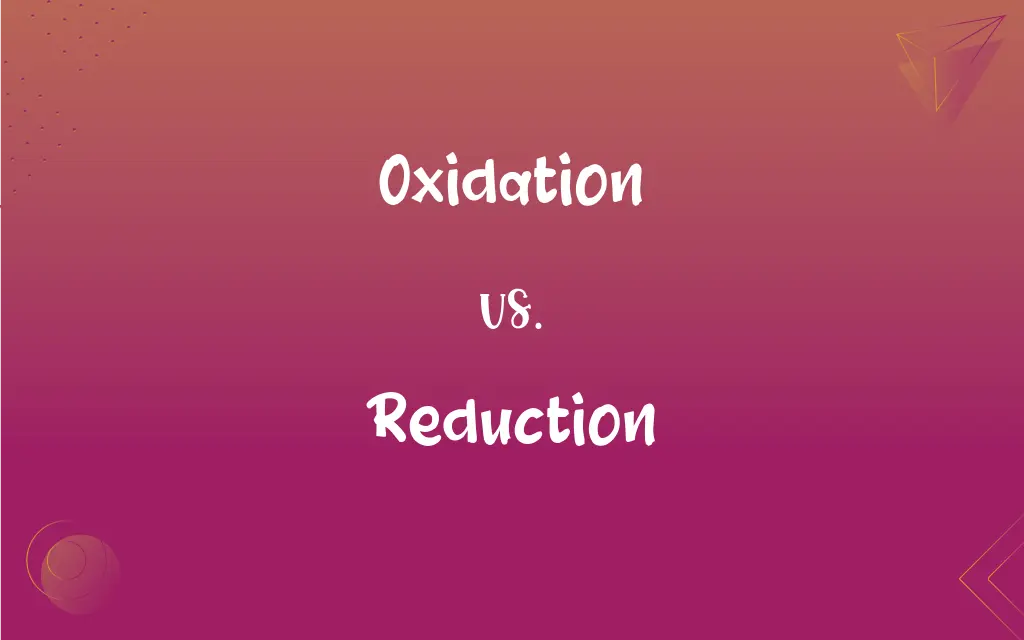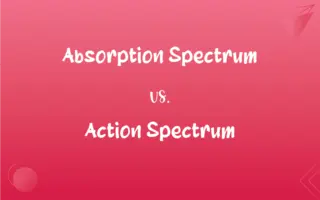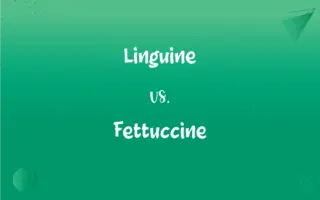Oxidation vs. Reduction: What's the Difference?
Edited by Aimie Carlson || By Harlon Moss || Updated on October 19, 2023
Oxidation involves loss of electrons; reduction involves gain of electrons.

Key Differences
In the realm of chemistry, oxidation and reduction are two processes that are intertwined. Oxidation is an event where an atom, ion, or molecule loses electrons, typically but not always, resulting in an increase in its oxidation state. On the flip side, reduction is a chemical reaction where electrons are acquired, leading to a decrease in the oxidation state.
Fundamentally, oxidation cannot occur without a corresponding reduction; this tandem action is known as a redox (reduction-oxidation) reaction. For instance, in the reaction where hydrogen reacts with oxygen to produce water, hydrogen undergoes oxidation by losing electrons, while oxygen undergoes reduction by gaining those electrons.
It's essential to realize that these processes don't only concern electron transfer. Sometimes, oxidation might be perceived as the addition of oxygen or removal of hydrogen, whereas reduction can be seen as the addition of hydrogen or the removal of oxygen.
Comparison Chart
Electron Process
Involves loss of electrons.
Involves gain of electrons.
Oxygen/Hydrogen Addition
Often seen as addition of oxygen or removal of hydrogen.
Typically involves the removal of oxygen or addition of hydrogen.
ADVERTISEMENT
Oxidation State
Results in an increase in oxidation state.
Results in a decrease in oxidation state.
Reducing/Oxidizing Agent
Becomes reduced.
Becomes oxidized.
Dependency
Cannot occur without reduction.
Cannot occur without oxidation.
Oxidation and Reduction Definitions
Oxidation
A reaction that results in the increase of the oxidation state of an element.
In the reaction of sodium with chlorine, sodium undergoes oxidation from 0 to +1.
Reduction
A chemical reaction where a substance gains electrons.
In the formation of water, oxygen undergoes reduction by gaining electrons from hydrogen.
ADVERTISEMENT
Oxidation
The process of a substance combining with oxygen.
The oxidation of glucose in the body provides energy.
Reduction
The process of removing oxygen from a substance.
The reduction of iron ore in a blast furnace results in the production of iron.
Oxidation
The removal of hydrogen from a substance.
The oxidation of alcohol results in the formation of aldehydes or ketones.
Reduction
A reaction leading to the decrease in the oxidation state of an element.
In the reaction between hydrogen and chlorine, chlorine undergoes reduction from 0 to -1.
Oxidation
A chemical reaction in which a substance loses electrons.
When iron reacts with oxygen, it undergoes oxidation to form iron oxide.
Reduction
Decreasing the complexity or intensity of something.
The reduction of a recipe's sugar content can make it healthier
Oxidation
A process wherein a material corrodes or deteriorates due to exposure to oxygen.
The oxidation of metal surfaces can lead to rust formation.
Reduction
The addition of hydrogen to a substance.
The reduction of an alkene leads to the formation of an alkane.
Oxidation
The combination of a substance with oxygen.
Reduction
The act or process of reducing.
Oxidation
A reaction in which the atoms of an element lose electrons and the valence of the element is correspondingly increased.
Reduction
The result of reducing
A reduction in absenteeism.
FAQs
What does reduction refer to in chemistry?
Reduction refers to a process in which a substance gains electrons, often seen as losing oxygen.
Can oxidation occur without reduction?
No, oxidation always has a corresponding reduction in a redox reaction.
Which agent undergoes reduction in a redox reaction?
The oxidizing agent undergoes reduction.
What happens to the oxidation state of an element during oxidation?
During oxidation, the oxidation state of an element increases.
What is the role of a reducing agent?
A reducing agent donates electrons and undergoes oxidation itself.
What is oxidation?
Oxidation is a process where a substance loses electrons, often seen as combining with oxygen.
Which process involves the gain of electrons?
Reduction involves the gain of electrons.
Do all oxidation reactions produce heat?
Not all, but many oxidation reactions, like combustion, are exothermic and release heat.
Is rusting an example of oxidation?
Yes, rusting is an example of iron undergoing oxidation.
Does reduction always mean decreasing something's size or amount?
No, in chemistry, reduction often means gaining electrons or removing oxygen.
What happens to the oxidation state during reduction?
During reduction, the oxidation state of an element decreases.
How are oxidation and reduction interrelated?
Oxidation and reduction always occur simultaneously in redox reactions.
Does burning involve oxidation?
Yes, burning typically involves the oxidation of a substance.
How is the term reduction used outside of chemistry?
Outside of chemistry, reduction can refer to decreasing complexity, intensity, or size.
Why are oxidation numbers useful?
Oxidation numbers help determine the degree of oxidation or reduction of an element in a compound.
Can reduction be seen as the addition of hydrogen?
Yes, in some reactions, reduction can involve the addition of hydrogen.
What is meant by the term "redox"?
Redox is short for reduction-oxidation, indicating reactions where both processes occur.
Is photosynthesis related to oxidation and reduction?
Yes, photosynthesis involves redox reactions where water is oxidized and carbon dioxide is reduced.
How does one identify the substance oxidized in a reaction?
The substance that loses electrons or increases in oxidation state is the one oxidized.
Can a substance be both oxidized and reduced in a single reaction?
Yes, in a process called disproportionation, a substance can undergo both oxidation and reduction.
About Author
Written by
Harlon MossHarlon is a seasoned quality moderator and accomplished content writer for Difference Wiki. An alumnus of the prestigious University of California, he earned his degree in Computer Science. Leveraging his academic background, Harlon brings a meticulous and informed perspective to his work, ensuring content accuracy and excellence.
Edited by
Aimie CarlsonAimie Carlson, holding a master's degree in English literature, is a fervent English language enthusiast. She lends her writing talents to Difference Wiki, a prominent website that specializes in comparisons, offering readers insightful analyses that both captivate and inform.































































